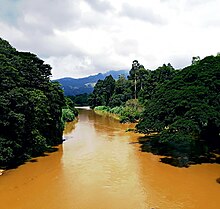Dirty Water
| "Dirty Water" | ||||
|---|---|---|---|---|
 Label on the 1965 US single | ||||
| Single by The Standells | ||||
| from the album Dirty Water | ||||
| B-side | "Rari" | |||
| Released | November 1965 | |||
| Recorded | March 5, 1965 | |||
| Studio | Universal Recorders (Hollywood, CA) | |||
| Genre | ||||
| Length | 2:48 | |||
| Label | ||||
| Songwriter(s) | Ed Cobb | |||
| Producer(s) | Ed Cobb | |||
| The Standells singles chronology | ||||
| ||||
"Dirty Water" is a song by the American rock band The Standells, written by their producer Ed Cobb.[3] The song is a mock paean to the city of Boston, Massachusetts and its then-famously polluted Boston Harbor and Charles River.
History
The song's Boston and Charles River references are reportedly based on an experience of Cobb and his girlfriend with a mugger in Boston in the mid-1960s.[4] In addition to the river, other local interest items in the song include the Boston University women's curfew—"Frustrated women ... have to be in by 12 o'clock"—and a passing mention of the Boston Strangler—"have you heard about the Strangler? (I'm the man I'm the man)." Boston is also home to Simmons College, a women's college that, like many such institutions, had a curfew for students. Cambridge, on the opposite banks of the Charles River, was home to Radcliffe College, then the women's college counterpart to Harvard College. There is disagreement regarding the identity of the "frustrated women". In a city with many colleges and universities, as well as a large Navy presence (historically), it could be purposefully unspecific.
Reception
First issued in late 1965 on the Tower label, a subsidiary of Capitol Records, the song debuted April 30, 1966 on the Cash Box charts and peaked at #8. It reached #11 on the Billboard singles charts on June 11. It was the band's first major hit single; their earlier charting record, "The Boy Next Door", had only reached #102 on Billboard's Bubbling Under chart in February 1965.
Although "Dirty Water" is beloved by the city of Boston and its sports fans, the song first became a hit in the state of Florida, breaking out on WLOF in Orlando in January 1966.
Dirty Water was also the title of the Standells' most successful LP, their only nationally charting album. This LP charted on both Billboard and Cash Box magazines' charts, peaking at #52 and #39, respectively, during the summer of 1966.
The song is traditionally played by Boston sports teams following home victories. The National Hockey League's Boston Bruins began playing the song in 1991, and Major League Baseball's Boston Red Sox followed suit after home victories beginning in the 1997 season.[citation needed] The surviving Standells have performed the song at Fenway Park from atop the Green Monster. The song's famous guitar riff was recorded with a Fender Telecaster through a Vox AC30 amplifier by Standells' guitarist, Tony Valentino. The song is also included in the soundtrack for the film Fever Pitch, which includes the Boston Red Sox leading up to the 2004 World Series.
"Dirty Water" was included in the influential compilation album Nuggets: Original Artyfacts from the First Psychedelic Era, 1965–1968, and is listed in the Rock and Roll Hall of Fame's "500 Songs that Shaped Rock and Roll".[5]
Though the song is credited solely to Cobb, band members Dodd, Valentino, and Tamblyn have claimed substantial material-of-fact song composition copyright contributions to it as well as contributing to its arrangement.
Covers and samples
- British garage rock revivalists The Inmates covered "Dirty Water" in 1979 (and replaced Boston and the Charles with London and the River Thames), a version which was a moderate hit and reached #51 on the Billboard Hot 100 singles chart in January 1980. This song was promoted with customized promo versions recorded for many towns distributed to radio stations. For example, the promo copy played on Jackson, Mississippi's WZZQ said "Pearl River" and "Jackson you're my home".
- The song is sampled at the beginning of "These Are the Days", the first track on The Ducky Boys' 1998 album Dark Days.
- Boston punk band Dropkick Murphys often include the song in live sets, such as the one documented on 2002's Live on St. Patrick's Day From Boston, MA and at the 2007 and 2018 Boston Red Sox baseball World Series victory rolling parade. A version recorded with The Mighty Mighty Bosstones' Dicky Barrett was released on Fenway Recordings' 2002 compilation In Our Lifetime, Vol. 3: The Revenge of Boston.
- Icelandic indie band Singapore Sling covered it in its 2002 debut album The Curse of Singapore Sling, released in North America and Europe the following year.
- Former Red Sox pitcher Bronson Arroyo's 2005 cover album, Covering the Bases, includes a version of the song.
- The Buffalo Sabres NHL team plays a cover version of this song before the beginning of the 3rd period. This version substitutes River Charles with Niagara River and Boston is replaced with Buffalo.
References
- ^ Unterberger, Richie. Song Review by Richie Unterberger at AllMusic. Retrieved February 3, 2016.
- ^ Danial Levitin (1 March 2014). The World in Six Songs: How the Musical Brain Created Human Nature. Aurum Press. p. 41. ISBN 978-1-78131-112-7.
- ^ Bruce Pollock (18 March 2014). Rock Song Index: The 7500 Most Important Songs for the Rock and Roll Era. Routledge. p. 77. ISBN 978-1-135-46296-3.
- ^ O'Nan, Stewart, and Stephen King. Faithful: Two Diehard Boston Red Sox Fans Chronicle the Historic 2004 Season. (Note that this book incorrectly refers to The Standells as a Boston proto-punk group, rather than a California garage band.)
- ^ "Experience The Music: One Hit Wonders and The Songs That Shaped Rock and Roll". Rockhall.com. Retrieved 18 December 2014.
